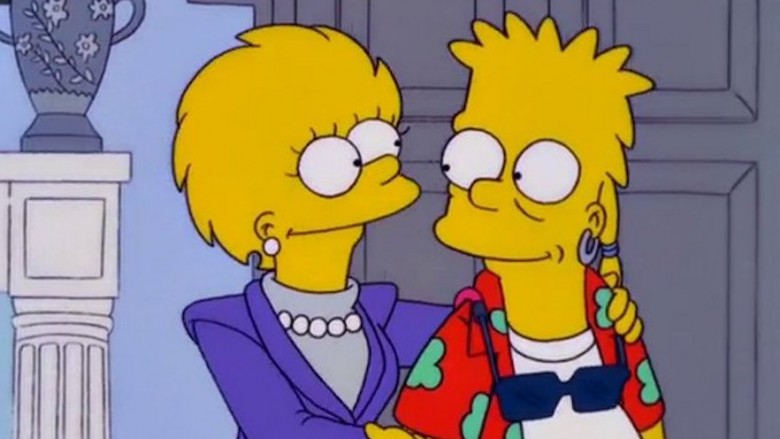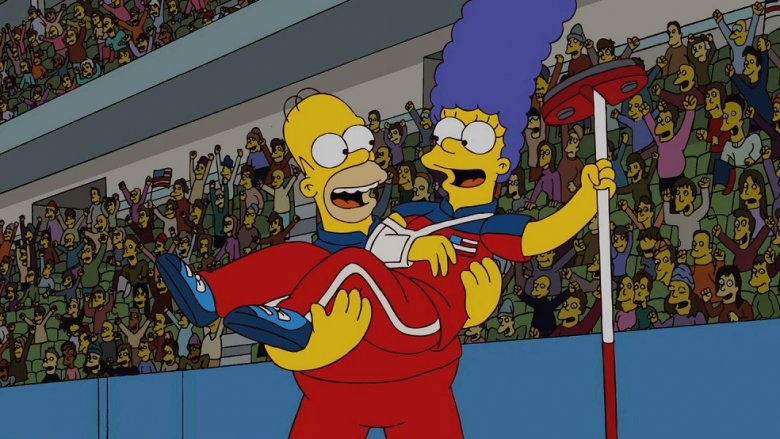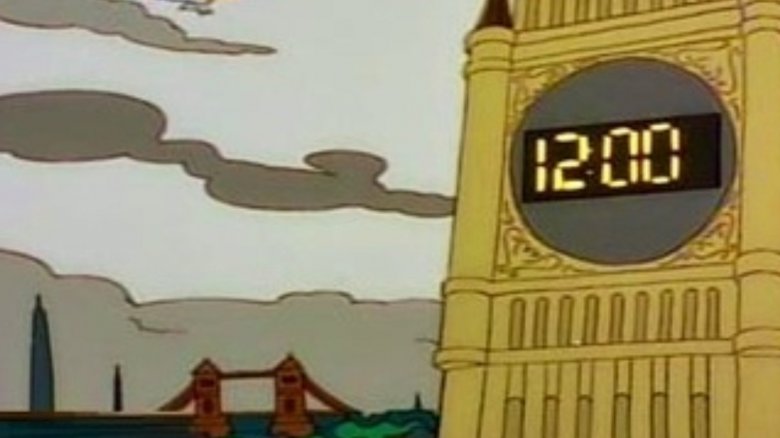Times The Simpsons Freakishly Predicted The Future
After being on the air for nearly 30 years and producing more than 600 episodes, there really aren't many things that haven't been made fun of by The Simpsons. The show's razor-sharp satire has taken aim at politicians, American life, human behavior, big business, parenting, education, pop culture, science, and more—and with such accuracy that it's even been able to predict the future from time to time. Here are a few occasions when The Simpsons knew what was going to happen before the rest of us.
President Trump
On a future-set episode of The Simpsons that aired in 2000, we learn that Bart is a broke bar musician doing Jimmy Buffett ripoffs and living with Ralph Wiggum. He makes big plans to mooch off his sister, Lisa, who has just been elected President of the United States. In her first cabinet meeting, President Simpson mentions that her administration has "inherited quite a budget crunch from President Trump." While a first name is never given, one can assume she's referring to Donald Trump, who, in January 2017, became the President of the United States. (Which means Lisa Simpson is up next.)
All-you-can-eat is a lie!
On "New Kid on the Block," a 1992 episode of The Simpsons written by Conan O'Brien, Homer sees a TV commercial for an all-you-can-eat seafood restaurant called the Frying Dutchman. (It's the first appearance of the Sea Captain.) Homer goes and proceeds to eat until closing, and is then kicked out...while still hungry. He then sues the restaurant for false advertising, and Homer and the Sea Captain come to an agreement: He can shove gobs and gobs of fried fish down his craw if he does it in The Frying Dutchman's window under a sign labeling him "Bottomless Pete: Nature's Cruelest Mistake," so as to draw more customers.
In 2012, Bill Wisth went to a Mequon, Wisconsin, restaurant called Chuck's Place for its weekly Friday night fish fry buffet. After a few trips, he wanted more, but the restaurant claimed they'd run out. Wisth refused to pay and planned on picketing Chuck's Place, telling reporters, "if the people who run the restaurant put up signs that say all you can eat, but then selectively not want to fill that promise, that's false advertising." The owner of Chuck's Place claimed Wisth had eaten more than 20 pieces of fish...and was violating the buffet's "no sharing" policy.
The Isotopes move to Albuquerque
The 2001 episode "Hungry, Hungry Homer" concerns Homer going on a hunger strike to prevent the local minor league baseball team, the Springfield Isotopes, from secretly moving to Albuquerque. In 2002, the minor league Calgary Cannons announced a move to Albuquerque, and the local paper published a poll asking readers to come up with a new name for the team. The Isotopes overwhelmingly won with 67 percent of the vote. While they admit they got the idea from The Simpsons, "Isotopes" is an appropriate fit for a team from that area, as New Mexico is near the site of many nuclear facilities, most notably the Los Alamos National Laboratory.
Don't bet on insurance
The 1997 episode "Hurricane Neddy" is all about Ned Flanders' spiritual and mental breakdown. A hurricane hits Springfield—specifically Ned's house, reducing it to rubble. The people of Springfield come together to rebuild it for Ned, because he's such a great guy...and, as his wife Maude remarks, they had no homeowners' insurance to cover the damage because Ned equated insurance with gambling. Ten years later, Darul Uloom Seminary of Deoband, an influential institution for the Sunni Muslim community of India, issued a fatwa, or edict, that decreed buying life insurance was—you guessed it—akin to gambling.
People unknowingly ate gym mats
Over the course of The Simpsons' run, there have been many scenes depicting the cost-cutting and utterly disgusting measures by which Lunchlady Doris will go to feed the children of Springfield Elementary. But she has her limits. In the 1995 episode "The PTA Disbands," Doris keeps using shredded newspaper and old gym mats as recipe ingredients, even though "there's very little meat in these gym mats." In 2014, a minor but disgusting scandal developed when the Environmental Working Group released a report that found a compound called azodicarbonamide in around 500 processed food products, primarily breads, including Wonder Bread, Pillsbury Dinner Rolls, and the bread they use to make sandwiches at Subway. What's so bad or surprising about that? The chemical is a filler that makes bread—and yoga mats—soft.
Uncle Herb's baby translator was made for real
In a handful of early Simpsons episodes, Homer meets his long-lost brother Herb, but then leaves him in financial ruin after he bets his whole car manufacturing business on a ridiculous car Homer designs. Left destitute, he moves in with the Simpsons, and gets rich again when, with Maggie's help, he creates and markets a baby translator that turns an infant's cries and sounds into English. As Marge says in the episode, "every mother in the world" would want one—and in 2004, Japanese high-tech company Takara developed a real-life prototype that analyzed a baby's sounds along with its facial expression and body temperature to alert parents that the baby was hungry, tired, or needed to go to the bathroom, among other needs.
The show clothed a naked statue before it was cool
In 1990's "Itchy & Scratchy & Marge," Marge goes on a crusade to clean up cartoons—via censorship. She abandons the cause when her fellow crusaders move to cover up Michelangelo's David when the Renaissance masterpiece visits a museum in Springfield. In 2001, a Lake Alfred, Florida, statuary shop called Fountain and Falls placed a small replica of David outside its front door. Never mind that it was a masterpiece—the statue is anatomically correct and shows off a man's genitals. The owner of a barber shop nearby complained to city hall about it. "I didn't even know it was art," said Jeanne Johnson. "To me, it's just a naked man standing on the side of the road." City officials asked Fountain and Falls to cover the statue's crotch with a loincloth.
Homer's theory of a donut-shaped universe was correct
At the end of "They Saved Lisa's Brain," a 1999 episode of The Simpsons in which Lisa and her local MENSA chapter attempt to rule Springfield with their superior intellect, the smartest guy in the world makes a cameo: physicist and cosmologist Stephen Hawking. He remarks to Homer, "Your theory of a donut-shaped universe is intriguing. I may have to steal it." In scientific parlance, "donut-shaped" is torus shaped. And yes, as it turns out, the universe may actually be donut- or torus-shaped. Four years after Homer Simpson "proposed" the theory, cosmologists noticed radiation patterns in space suggesting that the universe was round and tube-like, but "empty" in the middle. Mmmmm...space donut.
A lemon tree was stolen in real life, too
The kids of Springfield have a grand adventure with rival town Shelbyville in a 1995 episode about efforts to recover the town's beloved lemon tree, planted by settlers long, long ago. Those villains from Shelbyville ripped it right out of the ground! Who steals a lemon tree? The idea is absurd! Hannah Cook Wallace of Madison, Wisconsin, would agree, except the story happened to her. In the summer of 2011, the huge Meyer lemon tree she kept in a planter on her front porch for 20 years was stolen. "It's bizarre," Wallace told reporters.
Homer's life was saved by the man he mocked
In the 1997 episode "Homer's Phobia," the Simpsons befriend a kitsch shop owner named John (voiced by director John Waters). Homer loves the guy...until he finds out he's homosexual. Eventually, Homer gets over his fear and distrust of John when John is the bigger man and saves Homer from being gored to death by a bunch of reindeer. A very similar lesson was learned by Baljit Koonar in 2010. Koonar's home in Birmingham, England, was next door to Bryn and James Tudor, who in 2005 became the first same-sex couple in the city to obtain a civil partnership. Koonar publicly harassed and terrorized the couple...until they saved his life. Koonar's house was on fire early one morning, and the smell of smoke awakened James Tudor, who got Koonar and his family away from the house to safety.
A throwaway gag predicted Farmville
While attending "Colonel Tex's Traveling Carnival" in the 1998 episode "Bart Carny," the kids of Springfield are transfixed by a cutting-edge virtual reality game that allows them to...pretend they're doing yard work, such as trimming hedges and raking leaves. This is essentially Zynga's Facebook-based game Farmville, which racked up more than $1 billion in in-game purchases.
Homer determined the weight of the Higgs boson
While first proposed in 1964, it wasn't until 2013 that physicists discovered the Higgs boson, the field (and particle by which it could be detected) that basically holds atoms together—in other words, the very fabric of existence, and a key to understanding how the universe and matter work. Oddly enough, Homer Simpson, of all people, predicted the discovery of the Higgs Boson. On the 1998 episode of The Simpsons called "The Wizard of Evergreen Terrace," Homer attempts to become a scientist and inventor, and is seen messing around with some formulas on a chalkboard. His math actually gets pretty close to the one that determines the molecular weight of the Higgs particle.
Lady Gaga's Super Bowl halftime show
Lady Gaga played the halftime show of the 2017 Super Bowl, delivering a performance that was a spectacular for the ages, featuring high-wire stunts, pyrotechnics, theatrical costumes...and other elements that closely mirror the performance of an animated Gaga on a 2012 episode of The Simpsons. In "Lisa Goes Gaga," the pop star comes to Springfield for a concert and soars over the crowd in a harness while wearing an outfit (and knee-high boots) similar to the ones she eventually wore during the real-life Super Bowl.
Disney buys Fox
The Simpsons began life as a segment on The Tracey Ullman Show back in 1987, one of the Fox network's first shows. That means the yellow-hued family has been a staple of the network since the beginning, and as such frequently pokes fun at its corporate overlords. (For example, Homer gets annoyed with Lisa because she won't let the family "watch Fox 'cause they own those chemical weapon plants in Syria.")
The 1998 episode "When You Dish Upon a Star" found Homer working as a very annoying personal assistant to then-married couple Alec Baldwin and Kim Basinger (voicing themselves). The installment cracked numerous jokes at the expense of celebrities and Hollywood in general, allowing them to slip in another joke about Fox's business practices. There's a brief shot of the entrance to the 20th Century Fox lot, which a sign says is also "A Division of Walt Disney Co." Nearly two decades later, the Walt Disney Company, flush with cash from numerous successful Star Wars and Marvel movies, bought out competitor 21st Century Fox for a cool $71.3 billion. Disney now owns Fox ... and The Simpsons.
The Simpsons predict Team USA winning a gold medal in curling
Curling — a unique sport that involves the careful pushing and sweeping of a large "stone" into a circle on an ice rink — has been a regular event at the Winter Olympics since 1998. And in that time, teams from cold, snowy countries like Canada, Sweden, and Switzerland dominated the medal count. Team USA reached the medal podium only once, when the men's team won bronze in 2006.
The near lack of American presence in the sport added an extra air of improbability to the 2010 Olympics-themed Simpsons episode "Boy Meets Curl," in which Homer and Marge become a "mixed doubles" curling duo for Team USA. They wind up winning the gold medal, an achievement matched by the real American curling team in 2018. (Even weirder about this Simpsons prediction: The show predicted mixed doubles curling being an Olympic event in the first place. It wasn't part of the Winter Games until 2018, eight years after "Boy Meets Curl" first aired.)
Can you believe this Shard?
The 1995 Simpsons episode "Lisa's Wedding" is the first of many Simpsons episodes set in the future. This one takes place in the far-off year of ... 2010. Lisa, 23 years old and attending college, falls in love with a charming British man named Hugh (voiced by Mandy Patinkin), and they decide to get married. There's a lot of future-now-current technology on display in this installment. Lisa tells Marge of her big news via a Skype-like video call, while other characters wear wrist computers which resemble the Apple Watch. But video phones and two-way wrist communicators are old tropes for stories set in the "future." The truly eerie prophecy from "Lisa's Wedding" is the prediction of a new building on the London skyline.
When Lisa flies to England to meet her new potential in-laws, viewers get a glimpse of the updated London skyline — Big Ben has gone digital (and flashing "12:00") while a narrow, spire-oriented building stands out in the distance. It looks remarkably like a narrow, spire-oriented skyscraper called The Shard, an edifice that wasn't even proposed until the year 2000.
Fat Tony's ferret fiasco
Recurring character Fat Tony (Joe Mantegna) was the big man in charge of Springfield's "Legitimate Businessman's Social Club" — in other words he was the local organized crime boss. He was involved in a number of shady activities, including illegal gambling, running cigarettes and rum, selling fake milk ("malk," fortified with "Vitamin R") to schools, and offering extortion-style "protection" to Marge's pretzel business. The 2002 episode "Poppa's Got a Brand New Badge" involved one of the mobster's weirdest schemes ever. Homer's security company SpringShield busts Fat Tony gluing cotton balls onto ferrets, with plans to sell them to a pet store by passing them off as far more expensive toy poodles. It's a weird scheme ... and similar to one a real-life criminal actually attempted in 2013.
According to The Daily Mail, a retiree visited the massive La Salada outdoor bazaar in Buenos Aires, Argentina, and purchased two poodles. He took his new pets to a veterinarian for a checkup, only for the doctor to discover that they weren't poodles at all: They were ferrets given steroids to appear poodle-size.
The Simpsons somehow predicted a bloody billboard
Bart and Lisa Simpson love "The Itchy & Scratchy Show," the cartoon segment on The Krusty the Clown Show featuring the unspeakably violent and amazingly gory antics of a Tom & Jerry-parodying cat and mouse. In the 1992 Simpsons episode "Itchy and Scratchy: the Movie," the promoters of the duo's feature film have to pull out all the stops. So they install a billboard in Springfield showing Itchy (the mouse) using a movie camera to chop off the head of Scratchy (the cat). Blood (or presumably fake blood) spews out of the billboard with every chop, to the delight of drivers below who get splattered with the stuff.
When Quentin Tarantino's Kill Bill: Vol. 1, a work almost as violent as "The Itchy & Scratchy Show," debuted on TV in Australia in 2008, network TV2 contracted advertising firm Saatchi & Saatchi to inform the public. It did so with a billboard-meets-art-installation in which Uma Thurman's character The Bride held a katana that unleashed so much blood, it exploded beyond the printed panels and onto the side of a building, all over the street, and the white cars parked below.
The tragic attack in an animal act
In the early 1990s, Siegfried and Roy were staples of the Las Vegas entertainment scene. The German duo put on a show that was one part magical spectacle and one part animal act, involving beautiful white lions and white tigers.
The Simpsons characters of Gunter and Ernst are obvious parodies of the real world entertainers. In the 1993 episode "$pringfield (Or How I Learned to Stop Worrying and Love Legalized Gambling)," they come to Springfield to perform in Mr. Burns' casino, along with their white tiger, Anastasia. In their stage show "The Flamboyant Magic of Gunter and Ernst," viewers see Anastasia humiliated as she wears a dumb hat and rides a unicycle. The tiger then dreams about her old life in the jungle, which ended when Gunter and Ernst shot her with a tranquilizer dart. She then snaps back to reality and, full of rage, attacks Gunter and Ernst, ripping them to shreds.
Horrifically, the actual Roy Horn suffered a very similar traumatic event. During an October 2003 show at the Mirage in Las Vegas, a male white tiger named Mantacore bit and mauled Horn, sending the performer to a hospital's trauma unit. Horn was able to walk again, albeit with assistance, five months later.
Bengt Holmstrom wins a Nobel Prize
The 2010 episode "Elementary School Musical" begins with Lisa and her friends watching the announcement of that year's batch of Nobel Prize winners. As Lisa and her friends — Martin, Milhouse, and Database — are just a little bit nerdy, they've all made predictions and printed them out. The Simpsons' writers really do their research, aiming to get the details just right for even the briefest and most esoteric of sight gags. The friend group's little chart lists 20 possible Nobel winners across five categories, and all of them are real people and outstanding members of their field, including Vera Rubin (Physics), Richard Zare (Chemistry), Umberto Eco (Literature), and Piedad Córdoba (Peace). Milhouse's pick to take home the big prize in Economics: Bengt R. Holmstrom, a Finnish economist and MIT faculty member. Amazingly, the usually hapless Milhouse got it right: Holmstrom really did win the Nobel Prize for Economics in 2016.




















